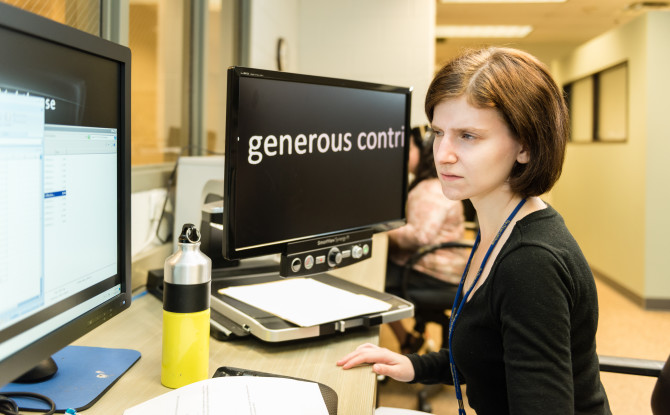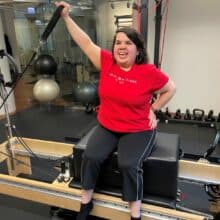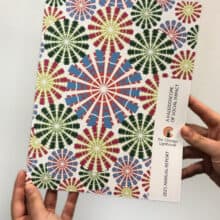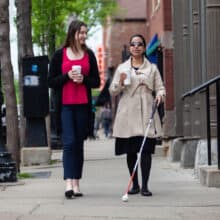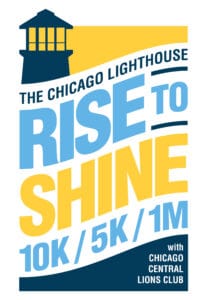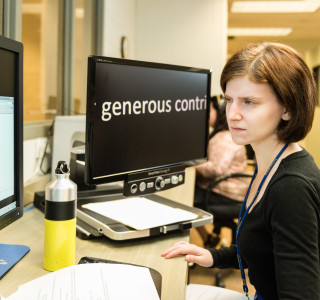
Guest Blogger: Sammi Grant on Life as a Blind Performer
My name is Sammi Grant and I am a colleague of Sandy’s at The Chicago Lighthouse. Sandy is taking a well-deserved vacation and has asked me to be her guest blogger for the day… Happy to oblige!
About me… I have been visually impaired since the age of two and legally blind since 10. My main eye issue is glaucoma, but I have a few other minor eye conditions as well as other health issues. At The Chicago Lighthouse, I work part-time as financial development assistant and volunteer coordinator. My great passion in life, as well as my main career, is theater. I work as a professional dialect/vocal coach and voiceover artist.
I was one of those overactive children who was always forcing my family to watch me put on performances and puppet shows. Naturally, my parents put me in drama camp. Being on stage felt right and I knew from the age of 10 that I wanted to be an actor. There was no question. I went to five years of drama camp and auditioned for every single play I could in junior high and high school. I auditioned for and applied to 10 acting colleges and ended up going to my second choice BFA program with a hefty talent scholarship. Nothing could stop me… except the real and perceived limitations of my blindness.
Being visually impaired has always been a part of my identity. For most of my childhood, I didn’t feel I was different than my friends and peers. Glaucoma is degenerative, so my vision has become worse over time. The feeling of being different has also grown over time. In high school, I was just as angsty as the next teen and did not want to be known as the blind girl. This went as far as me avoiding using assistive technology in public and not using a cane at all. In theater, my teachers and directors expressed worries about my ability to get around stage on my own and move during scene changes. Admittedly, I did fall off a stage during a scene change at the age of twelve, so their concerns were not unjustified, if a little over protective.
By the time I got to college, I really could not get away with not using a cane. It would now be obvious to anyone I met that I was blind. My difference was unavoidable, so it was time to start excepting it. However, this journey to accepting myself would be challenged by my acting classes. For the first time, I was being told that my vision was a problem in the way of my acting beyond my safety on stage. I had one professor in particular who made it his mission to get rid of my blindisms. It took me a long time to realize that I was not the problem, he was the problem. I simply did not fit into a cookie cutter actor box, so he did not know how to teach me. I was not normal, so he judged and assumed that I could not learn like the other “normal” students. Most of my other professors got over this issue really quickly. It was through their pushing and prodding that I learned I was really my own biggest judge and source of prejudice.
During my last two years of school, I sank my teeth into dialect and voice work, which I discovered was a natural talent for me. I was the teaching assistant for the voice and speech class, I coached dialects for a few shows and I had a voiceover internship in which I recorded commercials for three local radio stations. My blindness did not inhibit my voice work or teaching at all, and it felt so great.
A couple of years after graduating college, I made the very difficult decision to no longer pursue acting. I was not happy with my acting career and was facing the same prejudice of talent and ability I had felt from that one professor in college. Even when I was in a show I was not totally comfortable. I felt I always had to prove I deserved to be there because I was blind. My vision was once again getting worse and it was presenting me with more challenges on stage. My passion for acting was dissipating. I was once again feeling that self-loathing and acting felt like a chore. However, I had just made a huge break in my coaching career. I no longer had to seek out work; it came to me. My voiceover work was developing steadily. I was scared that this decision meant I was giving up on my dream; it took some time to realize that dreams change. I was and am chasing a new dream and my self-acceptance as a person with a visual impairment is stronger than ever.


